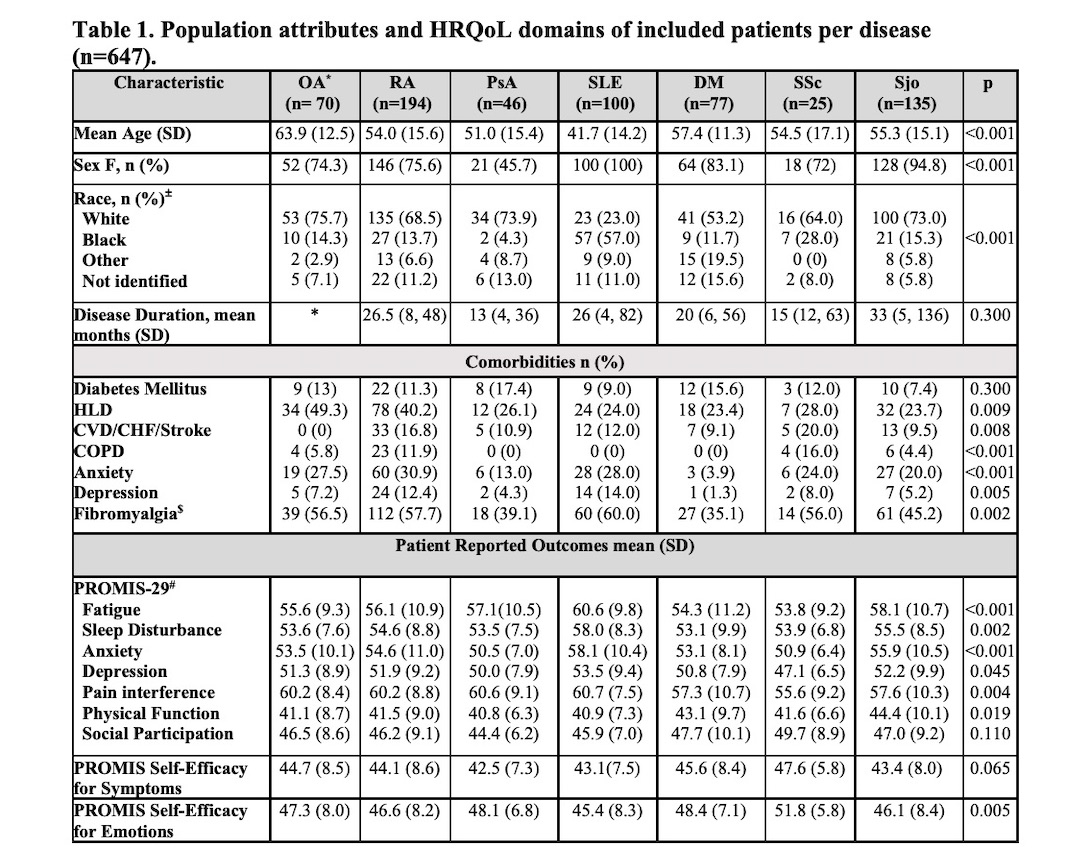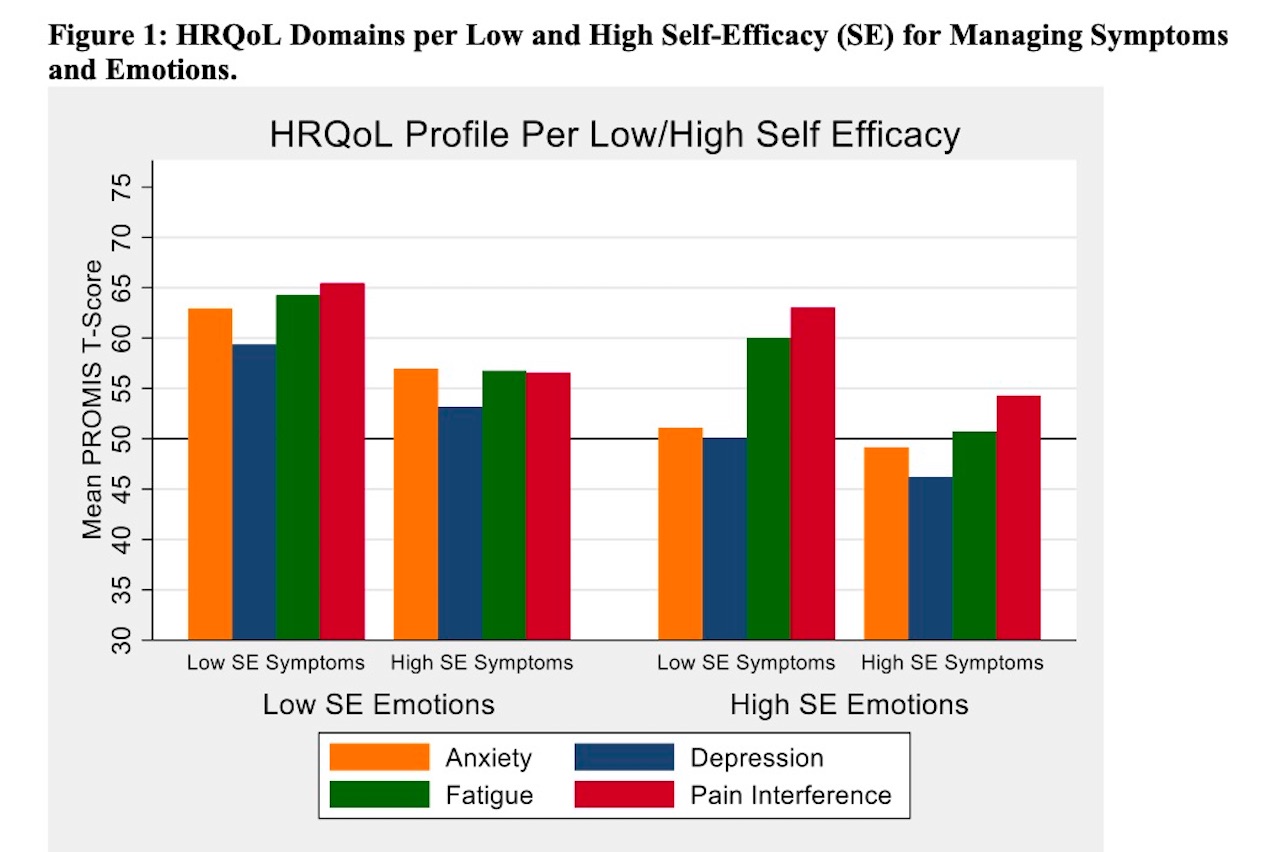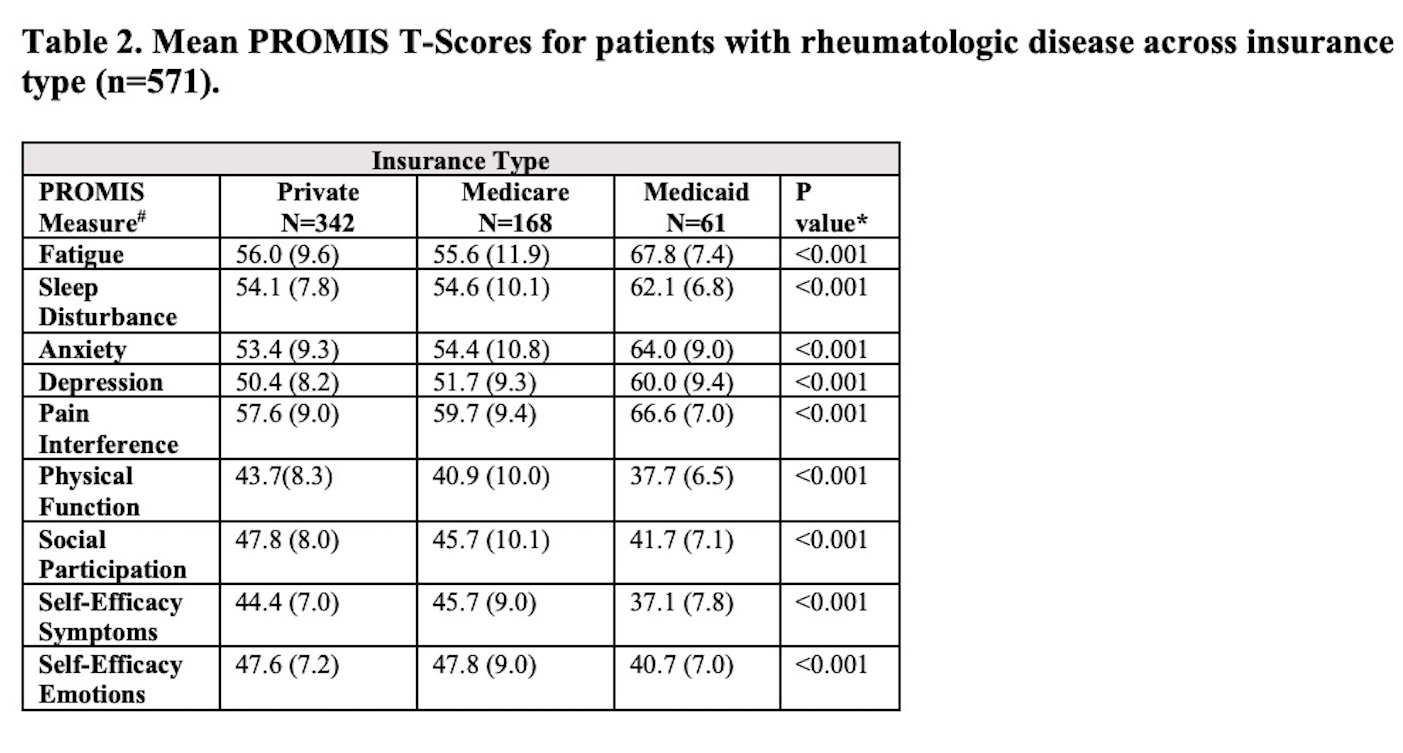Session Information
Date: Monday, November 13, 2023
Title: (1200–1220) Patient Outcomes, Preferences, & Attitudes Poster II
Session Type: Poster Session B
Session Time: 9:00AM-11:00AM
Background/Purpose: Self-efficacy (SE) is the inner belief in one’s ability to succeed in specific situations and tasks. SE for managing the symptoms and emotions associated with chronic disease has considerable impact on health-related quality of life (HRQoL) and health outcomes. The goal of this study was to describe SE for people living with various rheumatologic diseases with comparison across insurance type and clinic setting and correlation with HRQoL.
Methods: This study was a retrospective, cross-sectional analysis of patients in the rheumatology division at a large academic medical center who had office visits and completed self-efficacy PROMIS questionnaires from July 1, 2022 to January 1, 2023. Outpatient clinic locations were urban and suburban. Questionnaires included the Patient Reported Outcome Measurement Information System (PROMIS)-29 V2.1 collection of short, fixed forms (physical function, anxiety, depression, fatigue, sleep disturbance, ability to participate in social roles and activities, pain interference) and PROMIS Self-Efficacy for Managing Symptoms (SE Symptoms) and Emotions (SE Emotions) Computer Adaptive Tests. PROMIS T-scores are based on United States (US) population normative values with a mean (SD) T-score of 50 (10). Rheumatologic diagnosis was confirmed by the treating rheumatologist at the time of the encounter. Mean PROMIS T-scores were compared across gender, race, ethnicity, clinic location, rheumatologic diagnosis and insurance type using t-tests vs ANOVA or Kruskal-Wallis, where applicable.
Results: There were 1,619 patients who completed office visits during the study timeframe and 647 patients (40%) completed PROMIS measures. Mean age, sex, race, disease duration, and comorbidities varied significantly between diagnoses and patients with osteoarthritis were significantly older (Table 1). The median (IQR) T-score for SE Emotions was 46 (43, 52) and the median (IQR) T-score for SE Symptoms was 43 (39, 48) for those with rheumatologic disease, below US population normative values. All PROMIS domains statistically differed between disease groups except for SE Symptoms (p=0.065) (Table 1). Compared to those with high SE for managing symptoms and high SE for managing emotions (T-scores >43 and 46, respectively) those with low SE had significantly worse HRQoL in all PROMIS domains by 5-10 mean T-score units (p< 0.001) (Figure 1). Specifically, patients with low SE Emotions had more mood disturbance and patients with low SE Symptoms had worse pain and fatigue. Patients who had low SE Emotions/low SE Symptoms had the worst HRQoL profiles overall. HRQoL including SE domains were significantly worse for individuals with Medicaid (Table 2) but not by clinic location.
Conclusion: Self-efficacy (SE) for managing symptoms and emotions was lower than expected for people living with rheumatologic disease and especially lower for those with Medicaid insurance. This suggests that SE may be impacted by socioeconomic status but needs to be explored further. SE can be measured as part of routine rheumatology clinical care, and physician awareness and interventions to strengthen SE have the potential to improve patient outcomes.
*Missing data.
Other is defined as Native America, Alaskan, Asian, and “other” per patient report. Not identified is defined as missing or listed as “patient declined” per chart review.
$Extracted via chart review and not necessarily confirmed by rheumatologist.
#Higher PROMIS measures reflect more of a concept and lower PROMIS measures reflect less of a concept (ex., higher PROMIS physical function T-scores denote better physical function).
Excludes patients with self-pay.
*Significance determined by ANOVA.
#Higher PROMIS measures reflect more of a concept, and lower PROMIS measures reflect less of a concept (ex., higher PROMIS physical function T-scores denote better physical function).
To cite this abstract in AMA style:
Dayno R, George M, DeQuattro K, Blum M, Kolasinski S, DiRenzo D. Description of Self-Efficacy for Managing Symptoms and Emotions in a Large Rheumatology Clinic Population [abstract]. Arthritis Rheumatol. 2023; 75 (suppl 9). https://acrabstracts.org/abstract/description-of-self-efficacy-for-managing-symptoms-and-emotions-in-a-large-rheumatology-clinic-population/. Accessed .« Back to ACR Convergence 2023
ACR Meeting Abstracts - https://acrabstracts.org/abstract/description-of-self-efficacy-for-managing-symptoms-and-emotions-in-a-large-rheumatology-clinic-population/



